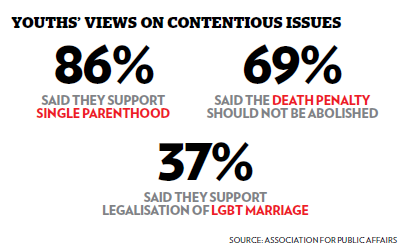SINGAPORE — While Singapore has done well in areas such as basic education and safety, it can do better in catering to the personal aspirations of its people.
This was the view of 244 student leaders surveyed at a forum last year by the Association for Public Affairs at the Lee Kuan Yew School of Public Policy (LKYSPP).
The association embarked on its inaugural project, called the SG100 Compass (Youth Edition) as Singapore approached its 50th year of independence last year.
It has completed its “dream” and “think” phases, and released its Dream Future Report.
Plans are in store for the “act” phase, where the youths will implement their ideas where possible, said association president Charles Phua Chao Rong, 34, yesterday.
A separate report with policy recommendations, following the survey findings, was submitted to members of the Cabinet last week, added Mr Phua, Organising Chairman of SG100 Compass and a PhD candidate in public policy at the LKYSPP.
Based on the survey of the student leaders, the top areas that respondents felt Singapore had done well in were: Ensuring low crime and accident rates (53 per cent), having an effective and incorruptible government (47 per cent), and ensuring access to affordable and convenient transport, including for the elderly and disabled (42 per cent).
What they felt Singapore fared poorly in were: Having a compassionate and kind society with a “kampung” spirit (62 per cent), respecting and supporting all career paths equally (51 per cent), and having low income inequality and good work-life balance (both 48 per cent). There were also areas which the respondents felt the country had done “okay” in, but had some room for improvement.
These were: An education that developed students holistically (74 per cent), every child having access to quality education for an equal head start in life (71 per cent), and equal opportunities for workers to upgrade and keep pace with new technology (67 per cent).
Elaborating on the next phase of the project, Mr Phua said the association is exploring part-time internships lasting six months for selected youths with the Ministry of Education and the Ministry of National Development.
And youths can also pilot some policy recommendations via community projects with schools, for instance.
Lessons learnt from implementation will be shared at a symposium in late 2017, he added.
The survey on how Singapore was faring was conducted at a forum in July last year, which was attended by about 500 participants from about 50 institutions.
They included students from junior colleges, polytechnics, universities and the Institute of Technical Education, as well as young working adults, said Mr Phua.
At the forum, speakers included LKYSPP dean Kishore Mahbubani and Minister in the Prime Minister’s Office Chan Chun Sing.
The youths have shown creativity and out-of-the-box thinking, questioning some fundamental assumptions such as why creativity and innovation are only taught at certain levels in school, said Mr Phua.
“Youths are passionate in wanting to make a difference, from small projects to even policymaking,” he added. “However, they are unsure how to do so in a safe-to-learn and safe-to-contribute environment. So I think this informal partnership, like what (the Association for Public Affairs) is doing with some support from government agencies, is a useful first step for youths.”







